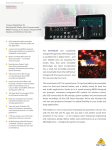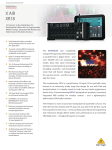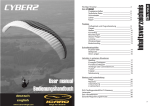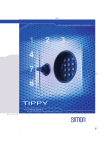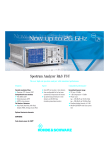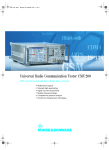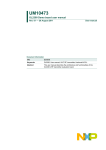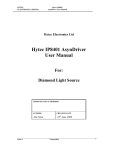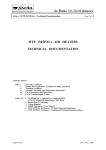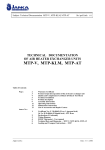Download R&S®FSP Spectrum Analyzer
Transcript
Product brochure Version 09.01 Spectrum Analyzer ¸FSP The medium-class standard Features Speed Performance ◆ 21 cm TFT colour display ◆ 1 Hz to 10 MHz RBW ◆ RMS detector for fast and reproducible measurements on digitally modulated signals ◆ Measurement routines for TOI, ACPR, OBW, amplitude statistics, multicarrier ACP ◆ EMI bandwidths and quasi-peak detector ◆ 2.5 ms minimum sweep time in frequency domain ◆ 1 µs sweep time in time domain ◆ Up to 55 GPIB measurements/s in frequency domain (including trace transfer) ◆ Up to 80 GPIB measurements/s in time domain (including trace transfer) ◆ Fast ACP measurement routine in time domain ◆ Total measurement uncertainty: 0.5 dB ◆ Displayed average noise level: –155 dBm (1 Hz) ◆ Phase noise: –113 dBc (1 Hz) at 10 kHz ◆ Dynamic range of RMS detector: 100 dB ◆ Synthesized frequency setting February 2005 The standard in the medium class … Features The Spectrum Analyzers ¸FSP are outstanding for their innovative measurements and a host of standard functions. Instead of a wide choice of options, the ¸FSP offers as standard all the functions and interfaces expected from a state-of-the-art spectrum analyzer: ◆ Largest colour display in its class ◆ Resolution bandwidths from 1 Hz to 10 MHz ◆ Highly selective digital filters and FFT ◆ Quasi-peak detector and EMI bandwidths ◆ ACP and multicarrier ACP measurements ◆ Convenient documentation of results as a hardcopy or file in PC-compatible formats ◆ Interfaces: GPIB, Centronics, RS-232-C, LAN (option), USB ◆ Automatic test routines for measuring TOI, OBW, phase noise and ACP(R) ◆ Split screen with separate settings and up to 3 traces per screen ◆ Editable limit lines including PASS/FAIL indication ◆ Fast measurements in the time domain: minimum sweep time 1 µs ◆ Gated sweep for measurements on TDMA signals 2 Spectrum Analyzer ¸FSP Speed In addition, the ¸FSP features the following unique attributes as standard: ◆ RMS detector for fast and reproducible power measurements on digitally modulated signals in frequency and time domain ◆ Statistical measurement functions for determining crest factor and CCDF (complementary cumulative distribution function) Featuring such a wealth of functions, the ¸FSP offers state-of-the-art spectrum analysis at an extremely attractive price/ performance ratio. Time is a finite resource – so high measurement speed is indispensable for competitiveness and cost-effective testing. Here, too, the new ¸FSP offers characteristics that make it top of the class: ◆ Up to 55 measurements/s on GPIB interface including trace transfer of 501 binary data ◆ 80 measurements/s on GPIB interface in zero span mode including trace transfer of 501 binary data ◆ Minimum sweep time of 2.5 ms Performance ◆ 1 µs time domain measurements ◆ Unique fast ACP mode for high-speed ACPR measurements in time domain using the standard-compliant test filters ◆ List mode for fast, selective power measurements Modern communication systems should provide optimum spectral efficiency at high data rates. For the 3rd generation of CDMA mobile radio systems currently under development, this is achieved through functions such as among other things, by high-precision power control. With 100 measurements/s in manual operation and digital filters with a sweep time 2.5 times faster than comparable analog filters, the ¸FSP will also prove beneficial in the day-to-day tasks of product development. The ¸FSP is the ideal partner in development and production, featuring low uncertainty in level measurement, as well as excellent RF characteristics: ◆ 0.5 dB total measurement uncertainty allows higher tolerances for the DUT, thus increasing production yield ◆ 0.07 dB linearity uncertainty (1 σ) is ideal for precise measurements, for example of gain control and ACPR ◆ RMS detector with >100 dB dynamic range measures power fast and accurately irrespective of the signal shape – almost like a thermal power sensor ◆ The displayed average noise level of typ. –155 dBm (1 Hz) is attained without the use of preamplifiers and thus without any reduction in dynamic range ◆ Typ. –145 dBc (1 Hz) phase noise at 10 MHz offset offers optimum conditions for ACPR measurements on WCDMA systems Resolution bandwidths of up to 100 kHz are fully digital and provide – in addition to high selectivity – an ideal basis for accurate (adjacent-) channel power measurements owing to a maximum bandwidth deviation of 3%. … now even faster Spectrum Analyzer ¸FSP 3 High-end characteristics … Rohde&Schwarz ASICs Logarithmic amplifier Top-class performance as offered by the ¸FSP essentially depends on the extensive use of digital signal processing and large-scale integration of components. The ¸FSP comes equipped with digital resolution filters between 10 Hz and 100 kHz featuring high selectivity and very low bandwidth deviation. The filters have an extremely low logarithmic level deviation of <0.2 dB in the range 0 dB to –70 dB. As they are implemented as ASIC functions, their great precision is attained without any reduction in measurement speed. For these demanding tasks, Rohde& Schwarz has developed ASICs tailored to the requirements of signal analysis. Key functions such as ◆ ◆ ◆ ◆ RMS detection Digital IF filtering Logarithmation CCDF measurement are "cast in silicon" and are thus faster than conventional solutions. RMS detector The RMS detector – a unique feature in all current Rohde&Schwarz spectrum analyzers – quickly yields stable and reproducible results even for complex signals such as CDMA. By performing a very large number of linear single measurements, followed by power integration, the detector avoids the measurement error inherent in conventional analyzers that arises from the averaging of the log video signal. The RMS detector of the ¸FSP measures all modern communication signals with unparalleled accuracy and speed. 4 Spectrum Analyzer ¸FSP CCDF The complementary cumulative distribution function (CCDF) describes the probability of a signal power exceeding a specific (usually the average) power. CCDF analysis is indispensable for determining the optimal transmitting power for CDMA signals, assuming that clipping over known, short intervals is tolerable. The ¸FSP with its dedicated CCDF measurement routine furnishes 106 single values in only 250 ms, thus enabling extremely accurate statistical analysis even of rarely occurring signal peaks. This analysis function, which is becoming more and more important, has been implemented for the first time in the Spectrum Analyzer ¸FSP as a fast and cost-effective solution based on ASICs. The platform Fit for the future Ergonomics and design Excellent specifications such as those of the ¸FSP require a high-grade and service-friendly platform. All the modules are optimally shielded and easy to exchange, and are accommodated in a lightweight but stable frame. A powerful low-noise fan in conjunction with low power consumption of 70 VA to 150 VA (depending on model) makes for high reliability. Owing to its modular design, the ¸FSP is optimally equipped to handle all present and future tasks. The design takes into account both hardware and firmware extensions to safeguard your investment far into the future. Thus, you can also rely on your ¸FSP to meet all requirements that will arise in the years to come. The ¸FSP sets the ergonomic standard in this class of analyzers. The 21 cm (8.4”) colour display is the largest and most brilliant in its category. Vertical and horizontal rows of softkeys allow even complex measurement tasks to be performed easily. Parameters such as frequency and amplitude are entered by means of dedicated hardkeys and unit keys. A 2-year calibration interval (excluding the reference frequency) is offered with the ¸FSP. … through innovative solutions Spectrum Analyzer ¸FSP 5 Innovative solutions … Optimum dynamic range * RBW * Att Ref -110 dBm Featuring the lowest displayed average noise level in its class (DANL <−145 dBm at 10 Hz RBW), the ¸FSP measures even small signals accurately without using preamplifiers that reduce dynamic range. Together with the high intercept point, this yields an intermodulation-free range of typ. 100 dB – yet another record among medium-class analyzers. 300 Hz 1 kHz 560 ms VBW SWT 0 dB -110 Delta 2 [T1] -5.26 dB -13.10000000 kHz -115 1 SA AVG Marker 1 [T1] -120.74 dBm 100.00380000 MHz A SGL 1 -120 2 -125 PRN -130 -135 -140 -145 -150 -155 Ultra-low measurement uncertainty In the vital frequency range below 3 GHz, the ¸FSP is outstanding for its ultralow measurement uncertainty. The total measurement uncertainty is less than 0.5 dB. Due to this excellent value, the use of power meters in routine lab applications very often becomes superfluous and may greater tolerances are possible for DUTs. Sweep Ctr 33 -160 Center 100 MHz Ref 10 dBm 5 kHz/ Att RBW VBW SWT 40 dB 1 AP VIEW -10 A -20 SGL -30 -40 -50 -60 -70 PRN -80 Center 835 MHz 100 ms/ Att RBW VBW SWT 30 dB -10 3 MHz 10 MHz 5 ms Delta 2 [T2] -4.37 dB 870.000000 µs Marker 1 [T1] -10.75 dBm 1.700000 ms -9 1 B SGL -11 1 RM * -12 VIEW -13 2 SA AVG -14 2 -15 The unique RMS detector measures modern, noise-like communication signals with optimal repeatability and stability. As there are neither correction factors nor the typical errors caused by averaging of logarithmic trace data, the correct average power is displayed with high stability for all signal types – almost like in measurements with a thermal power meter. 3 MHz 10 MHz 1 s 0 Ref -8 dBm RMS detector Span 50 kHz -16 -17 Sweep Ctr 999 Center 835 MHz 500 µs/ Noise figure measurements Owing to its excellent display linearity, the ¸FSP is also ideal for noise figure measurements. The optional Noise Measurement Software ¸FS-K30 enhances the ¸FSP to form a noise measurement system offering analyzer-specific advantages (see data sheet PD 0758.0839.32). 6 Spectrum Analyzer ¸FSP Noise figure measurement with Noise Measurement Software ¸FS-K30. Phase noise Ref -10 The low phase noise of the ¸FSP makes it suitable for demanding measurement tasks both in the vicinity of the carrier (typ. –113 dBc (1 Hz) at 10 kHz) and far from the carrier (typ. –125 dBc (1 Hz) at 1 MHz). The ¸FSP is thus optimally equipped for performing spectral analysis and ACPR measurements on narrowband systems such as IS136 or PDC as well as on wideband systems such as IS95 or WCDMA. Phase Noise Measurement Software ¸FS-K4 enhances the Spectrum Analyzer ¸FSP to form a phase noise tester. 0 dBm * Att 10 dB 1 * RBW VBW SWT 300 Hz 1 kHz 245 ms PHN -0.53 dBm Marker 1 [T1 FXD] -0.52 dBm 100.00000000 MHz -20 1 SA VIEW -40 -50 -60 -70 -80 Ref 2 PHN -90 Center 100 MHz 2.2 kHz/ 0 dBm * Att 10 dB * RBW VBW 1 SWT Span 22 kHz 30 kHz 100 kHz 2.5 ms PHN -0.688 dBm -20 1 SA VIEW PRN EXT Delta 2 [T1 PHN] -125.83 dBc/Hz 1.00000000 MHz Marker 1 [T1 FXD] -0.83 dBm 100.00000000 MHz -10 B -30 -40 -50 -60 -70 2 -80 PHN -90 Center 100 MHz 220 kHz/ Att 20 dB Span 2.2 MHz RBW 10 MHz SWT 250 ms 1 1 SA CLRWR 0.01 2 1E-3 3 1E-4 CCDF of a WCDMA signal. Marker 1 [T1] 0.010306703 7.72 dB Marker 2 [T1] 0.001004205 9.92 dB Marker 3 [T1] 0.000100206 11.60 dB Marker 4 [T1] 0.000010132 12.96 dB 0.1 The ¸FSP is the first spectrum analyzer to offer statistical analysis of signals by means of the complementary cumulative distribution function (CCDF) as standard and at an impressively high speed. The ¸FSP furnishes in only 250 ms the exact CCDF characteristic, average and peak power as well as the crest factor covering 1 million measured values. A -30 Ref -13.5 dBm CCDF analysis Phase noise measurement with the ¸FSP. Delta 2 [T1 PHN] -116.45 dBc/Hz 10.00000000 kHz A SGL 4 1E-5 PRN Center 2.225 GHz 2 dB/ Mean Pwr + 20 dB Complementary Cumulative Distribution Function Samples 1000000 Mean Power Peak Power Crest Factor Trace -32.98 -19.23 13.75 1 dBm dBm dB Preprogrammed standards for ACP measurements. ACPR measurements Adjacent-channel power ratio (ACPR) measurements, which many mobile radio standards stipulate for components and devices, are implemented in the ¸FSP by means of automatic test routines. All settings, measurements and filters required for a selected standard are activated at a keystroke. In addition to a large number of preprogrammed standards, the channel width and channel spacing can be individually selected. Owing to the excellent dynamic range, lowest phase noise in its class and the RMS detector, the ¸FSP sets the standard in the medium class also for ACPR measurements. … for research & development Spectrum Analyzer ¸FSP 7 Innovative solutions … High measurement speed The ¸FSP comes standard with different filter types for digital resolution bandwidths up to 100 kHz such as Gaussian filter, raised root cosine (RRC) filter and steep-sided channel filters. Up to a resolution bandwidth of 30 kHz, fast Fourier transform (FFT) is available in addition. In the analyzer mode, the Gaussian filters have the advantage of high sweep speed plus excellent resolution. At high span/RBW ratios, measurements using FFT can be as much as 300 times faster than measurements with digital filters. FFT filter 6 10 Digital RBW 100000 Sweep time in ms With 100 measurements/s in manual operation, a minimum sweep time of 2.5 ms and 1 µs zero span as standard, the ¸FSP is ideal for time-critical applications. The highly selective, fastsweep digital filters featuring "analog" response allow measurements on pulsed signals as well as the use of the built-in frequency counter. 7 10 10000 1.000 100 10 10 30 100 300 1000 Resolution bandwidth in Hz Comparison of sweep times for 200 kHz span using digital filters or FFT. Ref 2 dBm * Att 25dB * RBW 1 MHz VBW 3 MHz * SWT 10 ms 0 * A -10 1 AP CLRWR -20 2 AP VIEW -30 -40 PRN -50 -60 -70 -80 -90 Center 108 MHz 2 MHz/ Span 20 MHz Comparison of 1 MHz channel filter and normal 1 MHz resolution filter. 8 Spectrum Analyzer ¸FSP Measurement of adjacent-channel power in time domain: FAST ACP. Some mobile radio standards such as TETRA and IS136 require RRC filters for power measurement, a type of filter already included in the ¸FSP. In addition, the ¸FSP provides channel filters for other analog and digital methods, e.g. cdmaOne, AM/FM radio and ETS 300 113. Adjacent-channel power due to switching can also be measured using the channel filters. For the common mobile radio standards, the ¸FSP is equipped with test routines (fast ACP) that allow the adjacent-channel power in the time domain to be determined, which reduces measurement time and increases reproducibility. Featuring a maximum linearity uncertainty of only 0.2 dB and fast power measurement routines especially for digitally modulated signals, the ¸FSP is the ideal choice wherever the reduction of the test time and the number of rejects is of primary importance. 0.5 dB total measurement uncertainty Measurement uncertainty can be split into the part from the instrument and that introduced by the test setup. With lower uncertainty of the spectrum analyzer, greater tolerances can be allowed for the test setup. If the lower uncertainty of the analyzer is utilized to allow for higher DUT tolerances, the result will be a marked reduction of manufacturing rejects – an advantage that pays off immediately. With a total measurement uncertainty of 0.5 dB, the ¸FSP undisputedly ranks at the top, way ahead of other mediumclass analyzers. 55 measurements per second on GPIB interface 0.2 dB maximum linearity uncertainty All modern mobile radio systems achieve high spectral efficiency through precise control of transmitter output power or other means. The correct functioning of gain control, which may be as much as –70 dB depending on the system, is checked against the nominal value in a large number of individual measurements. Sweeps/s Span 10 MHz, sweep time 2.5 ms Sweeps/s Span 0 Hz, sweep time 100 µs 55 80 Binary IEEE 754 format Measurement speed on GPIB interface, with transfer of trace data. Settings: DISPLAY OFF, DEFAULT COUPLING, SINGLE TRACE, 501 POINTS. Linearity uncertainty in dB The high-speed GPIB interface enables up to 55 measurements/s including trace data transfer of 501 test points with the display switched off. In the zero span mode, 80 measurements/s are possible. This characteristic makes the ¸FSP by far the fastest spectrum analyzer on the GPIB interface. Valuable time can be saved in production, boosting throughput enormously. The ¸FSP thus supports you in getting your products more costeffective on the market. 0.6 0.4 0.2 0 – 0.2 – 0.4 – 0.6 0 10 20 30 40 50 60 70 80 90 dB below reference level Display linearity with ≤ 100 kHz resolution bandwidth (measurement on 30 devices). … for production Spectrum Analyzer ¸FSP 9 Innovative solutions … Measurement routines TOI, OBW … * RBW Ref * Att 10 dBm VBW SWT 20 dB 10 kHz 30 kHz 10 ms 10 1 2 0 The ¸FSP offers fast routines for a multitude of typical measurement tasks, which make result postprocessing superfluous by supplying the desired data directly: 1 SA AVG -10 -20 -30 TOI 31.47 dBm Marker 1 [T1 TOI] 2.60 dBm A 2.19990054 GHz SGL Marker 3 [T1 TOI] -55.49 dBm 2.19970008 GHz Marker 4 [T1 TOI] -54.80 dBm 2.20030148 GHz PRN -40 -50 ◆ Determination of TOI ◆ Occupied bandwidth (OBW) ◆ Burst power with peak, average and RMS indication as well as standard deviation ◆ Modulation depth of AM signals ◆ Phase noise ◆ Bandwidth marker 4 3 -60 -70 -80 Sweep Ctr 10 -90 Center 2.2 GHz Ref 77.7 kHz/ 30 dBm Att RBW VBW SWT 60 dB Span 777 kHz 3 MHz 10 MHz 5 ms Marker 1 [T1] -8.91 dBm 3.120000 ms 1 POWER [T1] PEAK -7.01 dBm RMS -16.65 dBm MEAN -18.11 dBm SDEV 2.47 dB 20 10 Of course these functions can also be used via the fast GPIB interface. Measurement of TOI. Marker 2 [T1 TOI] 2.59 dBm 2.20010101 GHz 1 SA CLRWR 0 Measurement of burst power (top). SGL Determination of OBW (bottom). -10 -20 -30 -40 -50 T2 PRN -60 T1 Center 835 MHz 500 µs/ Ref -30 dBm Att -35 10 dB 1 * RBW VBW * SWT T1 30 kHz 300 kHz 1 s T2 -40 -45 1 RM * -50 CLRWR -55 -60 Marker 1 [T1 OBW] -33.42 dBm 835.00000000 MHz OBW 1.28000000 Temp 1 [T1 OBW] -90.85 832.50000000 Temp 2 [T1 OBW] -39.57 835.64000000 MHz B dBm MHz SGL dBm MHz -65 -70 -75 -80 -85 Center 835 MHz 500 kHz/ Span 5 MHz RBW Ref Mix -10 dBm Att 20 dB 10 dBm * VBW SWT 10 1 0 1 AP CLRWR -10 100 Hz 300 kHz 300 ms Measurement of modulation depth of AM signal. Marker 1 [T1MOD] 2.02 dBm 455.00000000kHz MDEPTH 0.960% Delta 2 [T1 MOD] -46.35 1.00200000 Delta 3 [T1 MOD] -46.40 -1.00200000 A dB kHz SGL dB kHz -20 PRN -30 EXT -40 3 2 -50 -60 -70 -80 -90 Center 454.85kHz Comment A: DUT = PWRA2117.5 Date: 11.AUG.1999 16:18:35a 10 Spectrum Analyzer ¸FSP 300 Hz/ Span 3 kHz Input command Output FSP -28.3, -30.6, -38.1 SENSE:LIST:POW 100MHz,-0dBm,10dB,10dB,NORM,1MHz,3MHz,434us,0, 200MHz,-20dBm,10dB,0dB,NORM,30kHz,100kHz,1ms,0, 300MHz,-20dBm,10dB,0dB,NORM,30kHz,100kHz,1ms,0; Remote control of the ¸FSP via IEC/IEEE bus in list mode cuts down on measurement time. List mode 859x/8566-compatible IEC/IEEE bus command set In the List mode, the user only has to enter a few IEC/IEEE bus commands to perform measurements on up to 100 frequencies with different instrument setups in each case. A single command configures the list, and frequency, bandwidths, measurement time, reference level and RF attenuation can be set independently of each other. The SENSE:LIST:POWER:RESULT? query, for example, simultaneously transfers all measurement results to the process controller after the list has been processed. This feature reduces the time required for transfer via the IEC/IEEE bus. In conjunction with the very high measurement speed of the ¸FSP, it also allows the generation of time-saving test routines in production applications. attenuator as required for high throughput in production and so increases the availability and reliability of the measurement equipment. For example, the limit of 10 7 switching operations, which is typical of mechanical attenuators, already means a breakdown after approx. 6 months at 1.5 switching operations/s whereas the Electronic Attenuator ¸FSP-B25 can be switched any number of times without impairing the specifications. The optional Trigger Port ¸FSP-B28 allows idle times between the different settings to be minimized. With the aid of the optional LAN Interface ¸FSP-B16, the ¸FSP can be connected to common networks such as 100Base-T so that functions such as file logging on network drives or documentation of measurement results via a network printer are available. In addition, the ¸FSP can be remote-controlled via LAN), which is especially easy with the WindowsXP Remote Desktop function. This yields a clear speed advantage over the IEC/IEEE bus, in particular for the transmission of large data blocks. Electronic attenuator for high production throughput The optional Electronic Attenuator ¸FSP-B25 supplements the standard mechanical attenuator and provides a wear-and-tear-free setting range of 30 dB in 5 dB steps. The option does away with frequent switching of the mechanical The integrated switchable 20 dB preamplifier allows high-sensitivity measurements in the useful frequency range from 10 MHz to 7000 MHz. LAN interface In many applications, existing test software is to be used in automatic test systems alongside new devices. For this reason, the ¸FSP comes standard with an IEC/IEEE bus command set that is compatible not only with the ¸FSEx/ FSIQ family but also with the spectrum analyzers of the 859x/8566 series. Thus importance was placed on maximum compatibility in order to minimize the necessity for changes. ◆ Approx. 175 commands in IEEE488-2 format (incl. CF, AT, ST) ◆ The most important commands in IEEE 488-1 format (8566A, for exclusive use only) ◆ Selectable presets ◆ Selectable trace format 8560E to 8565E, 8566A/B, 8568A/B and 8594E are supported. The IEC/IEEE bus commands in IEEE488-2 format can be used together with the ¸FSP command set, making it possible to enhance and complete available software by using the innovative instrument functions of the ¸FSP (such as list mode, channel filters) without having to redesign the test software. … for production Spectrum Analyzer ¸FSP 11 Innovative solutions … GSM/EDGE measurements Application Firmware ¸FS-K5 allows the user to perform the most important GSM and EDGE transmitter measurements at a keystroke: ◆ Phase/frequency error (GSM) ◆ Modulation accuracy (EDGE) including 95:th percentile and origin offset suppression ◆ Power versus time ◆ Carrier power ◆ Modulation spectrum ◆ Transient spectrum ◆ Spurious emissions Error power and power versus chip for 1×EV-DO signal, measured with ¸FS-K84 Type Designation and/or application ¸FS-K4 Phase noise measurements (Windows software) ¸FS-K5 Modulation and spectrum measurements on GSM/EDGE base station and mobile signals ¸FS-K7 AM/FM/ϕM measurement demodulator for general applications ¸FS-K8 Bluetooth transmitter measurements ¸FS-K9 Power sensor measurements supports ¸NRP-Z11/-Z21/-Z22/-Z23/-Z24/Z51/-Z55/-Z91 with ¸NRP-Z4 USB adapter ¸FS-K72 Modulation and code domain power measurements in accordance with 3GPP TS 24.141 on base station signals (Node B) ¸FSP-B15 and ¸FSP-B70 ¸FS-K73 Modulation and code domain power measurements in accordance with 3GPP TS 25.121 on mobile station signals (UE) ¸FSP-B15: slot-based measurements ¸FSP-B70: additionally required for framebased measurements ¸FS-K74 HSDPA extension for ¸FS-K72 ¸FS-K76 Modulation and code domain power measurements on TD-SCDMA base station signals ¸FS-K77 Modulation and code domain power measurements on TD-SCDMA mobile station signals (UE) ¸FS-K82 Modulation and code domain power measurements in accordance with CDMA2000®/1xEV-DV on base station signals (also for measurements on IS95/cdmaOne signals) ¸FS-K83 Modulation and code domain power measurements on CDMA2000®/1xEV-DV mobile station signals (UE) ¸FS-K84 Modulation and code domain power measurements on 1xEV-DO base station signals ¸FS-K85 Modulation and code domain power measurements on 1xEV-DO mobile station signals (UE) R&S®FSP-K90 WLAN 802.11a Application Firmware ¸FS-K30 Noise figure measurements (application firmware), functions similar to ¸FS-K3, but remote- Preamplifier recommended, e.g. ¸FSP-B25 controllable for ¸FSP3/7 12 Spectrum Analyzer ¸FSP Additionally required options in the ¸FSP Bluetooth® signal measurements Measurement of initial carrier frequency tolerance of Bluetooth signal with ¸FS-K8. ◆ Enhanced measurement functionality in line with Bluetooth RF Test Specification (Bluetooth SIG) Rev. 0.91 ◆ Measurement functions – Output power – Adjacent channel power (ACP) – Modulation characteristics – Initial carrier frequency tolerance (ICTF) – Carrier frequency drift ◆ Simultaneous display of traces and all numerical measurement results ◆ Automatic limit value monitoring ◆ Ideal for use in development and production of Bluetooth modules Simultaneous power versus time measurement on eight slots of EDGE signal. Standard 3GPP modulation and code domain power measurements ◆ Adds measurement functions in line with the 3GPP specifications for the FDD mode ◆ For BTS/Node B signals: Application Firmware ¸FS-K72 ◆ For CDMA2000®/3GPP3 base station signals: Application Firmware ¸FS-K82/-K84 ◆ For UE signals: Application Firmware ¸FS-K73 ◆ High measurement speed of 4 s/measurement ◆ Code domain power and CPICH power ◆ Code domain power and rho (CDMA2000®/3GPP2) ◆ EVM and PCDE ◆ Code domain power versus slot ◆ EVM/code channel ◆ Spectrum emission mask Code domain power measurement versus slot. BLUETOOTH is a trademark owned by Bluetooth SIG, Inc., USA and licensed to Rohde & Schwarz. CDMA2000® is a registered trademark of the Telecommunications Industry Association (TIA -USA) Spectrum Analyzer ¸FSP 13 Innovative solutions … Scalar network analysis in wide dynamic range and at any frequency offset Ref -4 dBm RBW VBW SWT 0 dBm 10 dB 300 kHz 1 MHz 100 ms -10 LIMIT CHECK -20 PASS A -30 1 SA AVG The optional Internal Tracking Generator ¸FSP-B9 up to 3 GHz and External Generator Control ¸FSP-B10 extend the ¸FSP spectrum analyzers to scalar network analyzer functionality. The gain, frequency response, insertion and return loss are measured using a selective method in a wide dynamic range without any influence from the harmonics or spurious of the generator. The Internal Tracking Generator ¸FSP-B9 can be used in all ¸FSP models and covers the frequency range from 9 kHz to 3 GHz. A frequency offset of ±150 MHz can be set for measurements on frequency-converting modules. The tracking generator can be broadband-modulated by an external I/Q baseband signal. TG * Att -40 -50 160 -60 -70 -80 -90 PRN -100 Center 160 MHz Ref -21 dBm 1.2 MHz/ TG Att 0 dBm 10 dB RBW VBW SWT Span 12 MHz 300 kHz 1 MHz 100 ms -22 1 -23 1 SA AVG -24 -25 -26 T1 T2 Marker 1 [T1] -23.12 dBm 159.990000000 MHz ndB [T1] 3.00 dB BW 4.130000000 MHz Temp 1 [T1 ndB] -83.47 dBm 157.500000000 MHz Temp 2 [T1 ndB] -26.17 dBm 162.106000000 MHz B -27 -28 -29 -30 Center 161 MHz 700 kHz/ Span 7 MHz The ¸FSP-B10 option uses commercial RF signal generators as its external tracking source that can be controlled via the GPIB or a TTL bus. With this option the functionality of the internal tracking generator can be utilized: ◆ Normalization with interpolation also for reflection measurements with open and short ◆ Automatic bandwidth measurement with "n dB down" function ◆ Tolerance lines with PASS/FAIL assessment The ¸FSP-B6 option makes the Spectrum Analyzers ¸FSP suitable for analog TV measurement applications and provides a settable RF level trigger for measurements on pulsed RF signals that are used in TDMA transmission systems. … through custom-made options 14 Spectrum Analyzer ¸FSP Complete measurement solutions … Environmental compatibility ◆ ◆ ◆ ◆ Fast and easy disassembly Small number of materials Compatibility of materials Easy identification of substances through appropriate marking (plastics) ◆ Recycling of enclosure Open for the PC world … ◆ PC-compatible screenshots, no conversion software needed ◆ Windows printer support ◆ USB interface for connecting PC peripherals ◆ LabWindows driver ◆ LabView driver ◆ SCPI-compatible ◆ ¸FSE/FSIQ-compatible GPIB command set ◆ Customized training ◆ Solution-oriented consulting ◆ Application notes ◆ 2-year calibration cycle … and much more … no guessing games Spectrum Analyzer ¸FSP 15 Specifications in brief of the ¸FSP family Frequency range ¸FSP3 ¸FSP7 ¸FSP13 ¸FSP30 ¸FSP40 9 kHz to 3 GHz 9 kHz to 7 GHz 9 kHz to 13 GHz 9 kHz to 30 GHz 9 kHz to 40 GHz aging 1×10–6/year, with option ¸FSP-B4: 1×10–7 Frequency resolution Spectral purity Phase noise typ. –113 dBc (1 Hz) in 10 Hz carrier offset Residual FM typ. 3 Hz Sweep time Span >10 Hz 2.5 ms to 16000 s Span 0 Hz (zero span) 1 µs to 16000 s Resolution bandwidths 10 Hz to 10 MHz, FFT filter: 1 Hz to 30 kHz, channel filter, EMI bandwidths Video bandwidths 1 Hz to 10 MHz Display range DANL up to +30 dBm Displayed average noise level 1 GHz typ. –145 dBm typ. –145 dBm typ. –145 dBm typ. –145 dBm typ. –145 dBm 7 GHz – typ. –143 dBm typ. –145 dBm typ. –145 dBm typ. –145 dBm 13 GHz – – typ. –138 dBm typ. –138 dBm typ. –138 dBm 30 GHz – – – typ. –123 dBm typ. –128 dBm 40 GHz – – – – typ. –120 dBm –152 dBm –152 dBm – – – Displayed average noise level with optional on (option ¸FSP-B25 electronic attenuator on) Total measurement uncertainty, f < 3 GHz 0.5 dB Linear level display 0.2 dB (0 dB to –70 dB) Certified Quality System Certified Environmental System ISO 9001 ISO 14001 DQS REG. NO 1954 QM DQS REG. NO 1954 UM Spectrum Analyzer ¸FSP 16 Ordering information Order designation Type Order No. Spectrum Analyzer 9 kHz to 3 GHz ¸FSP3 1164.4391.03 Spectrum Analyzer 9 kHz to 7 GHz ¸FSP7 1164.4391.07 Spectrum Analyzer 9 kHz to 13.6 GHz ¸FSP13 1164.4391.13 Spectrum Analyzer 9 kHz to 30 GHz ¸FSP30 1164.4391.30 Spectrum Analyzer 9 kHz to 40 GHz ¸FSP40 1164.4391.40 Accessories supplied Power cable, compact manual, CD-ROM with operating manual and service manual. ¸FSP30: test port adapter 3.5 mm female (1021.0512.00) and N female (1021.0535.00) ¸FSP40: test port adapter K female (1036.4770.00) and N female (1036.4777.00) Related data sheets Title Order No. TV Trigger/RF Power Trigger ¸FSP-B6 PD 0757.6433 Phase Noise Measurement Software ¸FSE-K4 PD 0757.4201 GSM/EDGE Application Firmware ¸FS-K5 for ¸FSP PD 0757.6185 FM Measurement Demodulator ¸FS-K7 PD 0757.6685 Bluetooth Application Firmware ¸FS-K8 PD 0757.7730 Application Firmware for Noise Figure and Gain Measurements R&S®FS-K30 for R&S®FSP/FSU/FSQ PD 0758.0839.32 WCDMA 3GPP Application Firmware ¸FS-K72/-K73 PD 0757.7246 CDMA2000® Base Station Test Application Firmware 1xEV-DO Base Station Test Application Firmware ¸FS-K82/-K84 PD 0757.7675 WLAN 802.11a Application Firmware R&S®FSP-K90 PD 0758.0916.22 ¸FSP Specifications PD 0757.8565 Spectrum Analyzer ¸FSP 17 Europe: Tel: +49 1805 12 4242, e-mail: [email protected] · North America: Tel. +1 410-910-7988, e-mail: [email protected] www.rohde-schwarz.com Asia: Tel. +65 68463710, e-mail: [email protected] PD 0758.1206.12 · Spectrum Analyzer ¸FSP · Version 09.01 · February 2005 · Data without tolerance limits is not binding · Subject to change ¸is a registered trademark of Rohde&Schwarz GmbH&Co. KG · Trade names are trademarks of the owners · Printed in Germany (Pe as) The Spectrum Analyzers ¸FSP … ◆ Unparalleled range of functions ◆ Highest measurement speed ◆ Maximum precision With the ¸FSP family, the well-known advantages of the Rohde&Schwarz high-end analyzers have been systematically integrated into the medium-class analyzers. The ¸FSP sets the standard for the medium-class regarding the vital criteria of functionality, measurement speed and accuracy. The use of innovative techniques such as a highly integrated front-end and fully digital signal processing in the back-end, together with ASICs developed by Rohde & Schwarz, has resulted in a product that features top-class specifications and high reliability. … the medium-class standard Schnittkante für die Einklappseite Position: Einklapper hängt an der Titeseite! A wealth of functions … Schnittkante für die Einklappseite Function/Option Standard Highly selective digital filters from 10 Hz to ● 100 kHz Fast FFT filters from 1 Hz to 30 kHz ● Channel filter 100 Hz to 5 MHz ● QP detector & EMI bandwidths 200 Hz, ● 9 kHz, 120 kHz 2.5 ms sweep time in frequency domain ● 1 µs sweep time in time domain ● Time-selective spectrum analysis with ● gating GPIB interface, IEEE 488.2 ● USB interface ● RS-232-C serial interface, 9-pin D-sub ● VGA output, 15-pin D-sub ● PC-compatible screenshots on floppy disk ● or hard disk Measurement speed manually ● up to 100 measurements/s Measurement speed GPIB ● up to 80 measurements/s SCPI-compatible GPIB command set ● ¸FSE/FSIQ-compatible GPIB command ● set 856XA/B-compatible command set ● Fast ACP measurements in time domain ● CCDF measurement functions ● RMS detector with 100 dB dynamic range ● 2-year calibration interval1) ● Cabinet for portable use – AM/FM audio demodulator – OCXO reference frequency – TV trigger/RF power trigger – Tracking generator – External generator control – Pulse calibrator – LAN interface – Extended environmental specification – LO/IF ports for external mixers – Electronic attenuator – Trigger port – Frequency range extension 20 Hz – DC power supply – Battery pack/spare battery pack – Demodulation hardware memory extension – 1) Except reference frequency. … the medium-class standard Option B1 B3 B4 B6 B9 B10 B15 B16 B20 B21 B25 B28 B29 B30 B31/B32 B70























